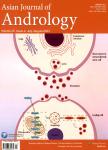Spermatozoa protein alterations in infertile men with bilateral varicocele
Spermatozoa protein alterations in infertile men with bilateral varicocele作者机构:Center for Reproductive Medicine Glickman Urological and Kidney Institute Cleveland Clinic Cleveland OH USA Faculty of Medicine MARA University of Technology Selanger Malaysia Lerner Research institute Cleveland Clinic Cleveland OH USA
出 版 物:《Asian Journal of Andrology》 (亚洲男性学杂志(英文版))
年 卷 期:2016年第18卷第1期
页 面:43-53页
核心收录:
学科分类:090602[农学-预防兽医学] 07[理学] 08[工学] 070206[理学-声学] 09[农学] 0906[农学-兽医学] 0802[工学-机械工程] 0702[理学-物理学]
基 金:supported by an internal grant from the Research Program Committee of the Cleveland Clinic by financial support from the Center for Reproductive Medicine. The Orbitrap Elite mass spectrometer used in this study was purchased with funds from an NIH shared instrument (BW) Supplementary information is linked to the online version of the paper on the Asian Journal of Andrology website
主 题:bilateral varicocele bioinformatics male infertility proteomics spermatozoa proteins varicocele
摘 要:Among infertile men, a diagnosis of unilateral varicocele is made in 90% of varicocele cases and bilateral in the remaining varicocele cases. However, there are reports of under-diagnosis of bilateral varicocele among infertile men and that its prevalence is greater than 10%. In this prospective study, we aimed to examine the differentially expressed proteins (DEP) extracted from spermatozoa cells of patients with bilateral varicocele and fertile donors. Subjects consisted of 17 men diagnosed with bilateral varicocele and 10 proven fertile men as healthy controls. Using the LTQ-orbitrap elite hybrid mass spectrometry system, proteomic analysis was done on pooled samples from 3 patients with bilateral varicocele and 5 fertile men. From these samples, 73 DEP were identified of which 58 proteins were differentially expressed, with 7 proteins unique to the bilateral varicocele group and 8 proteins to the fertile control group. Majority of the DEPs were observed to be associated with metabolic processes, stress responses, oxidoreductase activity, enzyme regulation, and immune system processes. Seven DEP were involved in sperm function such as capacitation, motility, and sperm-zona binding. Proteins TEKT3 and TCP11 were validated by Western blot analysis and may serve as potential biomarkers for bilateral varicocele. In this study, we have demonstrated for the first time the presence of DEP and identified proteins with distinct reproductive functions which are altered in infertile men with bilateral varicocele. Functional proteomic profiling provides insight into the mechanistic implications of bilateral varicocele-associated male infertility.



